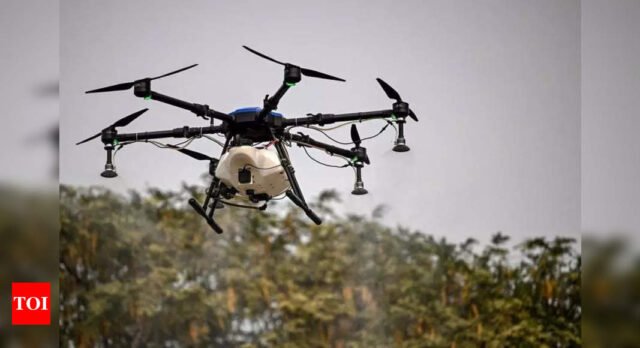Vijayawada: The Vijayawada Municipal Corporation (VMC) is set to revolutionise sanitation management by incorporating drone technology into its operations.
In a bid to address the mounting garbage issue, the sanitation and health department has announced that drones will be used to survey the city regularly to identify areas with poor sanitation management.The initiative aims to resolve challenges such as illegal dumping of construction waste, garbage piling up along canal bunds, and litter accumulating in vacant lots and suburban areas. Although CCTV cameras were installed in several locations to monitor such activities, they have yielded limited success.
Under the new system, a drone survey will be conducted every ten days in each division to pinpoint garbage hotspots. The findings will be forwarded to respective sanitary secretaries, who must clear the waste within a specified timeframe and submit photographic proof of the cleanup to the command control room. Strict action is planned against officials failing to comply.
Chief medical officer Suresh Babu expressed optimism about the initiative, stating, “Innovative drone technology will significantly improve sanitation in Vijayawada. While drones cannot remove garbage, they help identify inaccessible areas with waste accumulation and bad odors for immediate action. We’ve already seen success with drone usage in the malaria department for spraying stagnant water to prevent mosquito breeding.”
However, the AP municipal workers union has raised concerns over the additional pressure this initiative may place on sanitation workers.
It argued that workers are already overburdened by app-based photo submissions, and drone survey may add to their workload.
In a bid to address the mounting garbage issue, the sanitation and health department has announced that drones will be used to survey the city regularly to identify areas with poor sanitation management.The initiative aims to resolve challenges such as illegal dumping of construction waste, garbage piling up along canal bunds, and litter accumulating in vacant lots and suburban areas. Although CCTV cameras were installed in several locations to monitor such activities, they have yielded limited success.
Under the new system, a drone survey will be conducted every ten days in each division to pinpoint garbage hotspots. The findings will be forwarded to respective sanitary secretaries, who must clear the waste within a specified timeframe and submit photographic proof of the cleanup to the command control room. Strict action is planned against officials failing to comply.
Chief medical officer Suresh Babu expressed optimism about the initiative, stating, “Innovative drone technology will significantly improve sanitation in Vijayawada. While drones cannot remove garbage, they help identify inaccessible areas with waste accumulation and bad odors for immediate action. We’ve already seen success with drone usage in the malaria department for spraying stagnant water to prevent mosquito breeding.”
However, the AP municipal workers union has raised concerns over the additional pressure this initiative may place on sanitation workers.
It argued that workers are already overburdened by app-based photo submissions, and drone survey may add to their workload.







